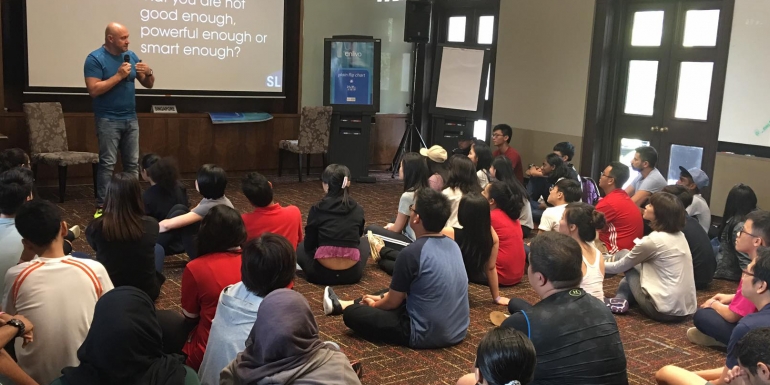Leadership can’t be taught in a classroom – or can it? This article explores leadership lessons from practical experience as well as the transformational power of wanting to make a difference.
In 2015, I received a call from Leona Tan, then a Managing Director at UBS in Singapore; “We know you coach leaders, how would you like to help us rescue a failing CSR project to help at-risk teenagers learn communication and leadership skills?”
I paused, this was not my ‘target market’ and I wondered if my ‘style’ of challenging people to practice Self-leadership would fly with youth. Particularly youth who were most likely to be experiencing low self-worth. Leona then went on to explain that UBS managers and senior leaders would be ‘mentors’ to the teenagers, and I would get to coach them as well. I would like to say that I immediately saw the wisdom of such an approach, but I know I underestimated the transformation that subsequently ensured.

UBS has an impressive campus for it’s learning and development, Command House. The stately Former British Military Command House was constructed during the mid-nineteenth century and one of the last defenses against the invading Japanese troops in 1942. A fitting back-drop to teach leadership or an ironic reminder of the failure of some leaders to predict the future?
The teenagers for the program come from local schools under an arrangement with CampVision, a local charity started by the visionary Suan Wei Yeo. These young people are at-risk for various reasons including; bullying, self-harm, attempted suicide, an incarcerated parent, parents with drug use, gender confusion, or attention deficit disorders. Thankfully I had no idea which youth had which problem, or any at all, which informed my approach, which was to see everybody as having potential and to treat the youths and their mentors as equals.
Nobody cares what you know…
I have been a Professional Speaker for 18 years and coached CEO’s of Fortune 500 companies, but when I first stood in front of these teenagers and their volunteer mentors, I realized I was going to have to adapt, and adapt fast.
These teenagers were not interested in my experience or expertise, to them I was just another authority figure, just like the ones that had previously, and unsuccessfully, been facilitating the program. I started telling stories about my life learning, but my stories were too long and I could see them quickly losing interest. I asked them about themselves, but they were shy and not willing to open up to someone they didn’t trust.
Recognizing that I was at risk of losing their attention, and my opportunity to make a difference, I switched to some facilitated games that taught confidence and communication. These were a hit and I got through the first session. Following the session, the youth met, in groups, with their UBS mentors, and talked about goals that they were supposed to set, and I met with Leona for some feedback.
The feedback was immediate and to the point. Leona quickly pointed out what worked and what didn’t. Whilst a little tough to digest so suddenly after speaking, it was an invaluable gift. Realizing that this program was not about me, or how good I was as a speaker, but how much these kids could absorb and process, was a turning point.
For the next and subsequent sessions, I came prepared. I prepared my messages in ‘bite sized’ chunks with engaging activities, and I prepared myself to be open and vulnerable to the teenagers. I also prepared coaching for the mentors on how to build connection and accountability with the youth. Most importantly I chose not to ‘dumb down’ the messages because the audience was young, but instead to ‘up’ the amount of respect I showed them.
… until they know how much you care.
Having run leadership programs for managers and leaders, I have often witnessed defensiveness and cynicism from participants, who are skeptical that your ideas will have any real impact on their work, but when I worked with these UBS mentors, their hearts and minds were open because they had a real desire to get better for the sake of the the teenagers.
The 2015 program ended, and was deemed successful, which was great news considering it had been failing and I was only ‘parachuted in’ at the half-way point. I was invited back to run ten, 3-hour sessions with the teenagers and mentors in 2016. This time I had fully ‘drunk the Kool-aide’ and was passionate to create real transformations this time around. I was encouraged by two things, 1) some of the teenagers had chosen to return to the program again, and 2) some of the UBS mentors had been promoted, in part because of the leadership skills they had learned during the program.

This time I had adapted my Self-leadership methodology to connect to the heart of the problem for the youth, and their mentors – the Me/Not Me boundary. Identity is such an important thing, and if we are being told who we are and that feels in-congruent, then it’s hard to build healthy self-esteem, and self-confidence which are essential to effective communication and leadership.
Each session, we began with everybody taking ownership of their thoughts, feelings, words and actions, by strongly saying, “MINE!”
A key element that lead to the youth becoming more confident was to apply the ‘Pygmalion Effect’, in short, I believed everybody could transform, before they believed it themselves.
We broke down the hierarchy by labeling everybody as a learner. Using a sporting analogy, I was the ‘coach’, the mentors were the ‘players’ and the teenagers were the ‘rookies’. This enabled me to be true to the CampVision’s vision of an Adventure of Equals, and I set this as a ‘tone’ at the beginning of each session.
With this ‘frame’ of equality, the mentors had permission to be more vulnerable and this chemistry gave the teenagers permission to ‘open up’ and to share what they were thinking and feeling.
With this new, safe learning environment, I was able to coach rookies and players alike, in front of the group. This vicarious learning raised the bar for everyone, and the ‘esprit de corps’ was palpable.
On the last day each of the youth gave a speech about their learning journey. Remember these are young people who wouldn’t have looked you in the eye on day 1, and they spoke with the confidence and clarity that would have won them a Toastmasters competition. I cried. I think everyone was moved at the visible transformations.
We have just completed the 2017 program, and the results have again been truly remarkable. At the final speech, I was again moved to tears by the authenticity and creativity of these young people, and the growth in leadership by the mentors.
What Can Leaders Learn?
I am so grateful to UBS and CampVision for the opportunity to contribute to this program. I think I am the most transformed of anybody. So let me share my lessons for leaders:
- Do something that matters more than money
- Don’t talk about leadership, do leadership
- People don’t care how much you know, until they know how much you care
- Just because someone doesn’t start with privilege, doesn’t mean they can’t catch up and overtake, so ‘see the potential’.
- Connection is about being interested, but if you want their attention, be interesting
- Build an environment where people feel safe to be themselves
- Break down hierarchical barriers and be vulnerable
So can Leadership be taught in a classroom? Please comment.
————————————————————————————————–
? Andrew Bryant is a Global Expert on Self Leadership & Leading Cultures. He partners with international & global organizations to develop leaders and leadership cultures. www.selfleadership.com/ | +65 64080702
? Invited to speak in 20+ countries on 4 continents with 150,000+ people inspired, he is known to be an effective, confident, humorous & thought provoking motivational & TEDx speaker. www.andrewbryant.global



